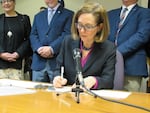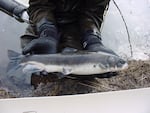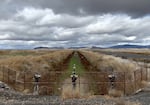The Klamath Basin has been plagued by drought and a lack of water for years. Last year, the region faced one of the worst droughts on record, and this year Gov. Kate Brown declared a drought emergency in Klamath County for the third year in a row.
Related: Conversations from 2021: Drought in the Klamath Basin
The effects are far-reaching for tribes, ranchers, farmers, waterfowl advocates and people who rely on residential wells. OPB spoke to people from the region to hear how they’re faring as they face another dry year.
Yurok Tribe see an increase in salmon population, but numbers remain low

Barry McCovey, Fisheries Department director for the Yurok Tribe, stands on the tribe's fishing dock where the Klamath River meets the Pacific Ocean in 2021.
Sage Van Wing / OPB
Last year, the Yurok Tribe in Northern California faced a catastrophic fish kill. The losses will affect salmon populations for years to come. But this year, salmon numbers are faring better. Barry McCovey is the Fisheries Department director for the Yurok Tribe.
Although numbers have improved, he says it’s important to recognize that salmon populations remain low.
“We’re still in a really bad spot,” he said. “Last year was so catastrophic that it makes this year look good. But this year, by no stretch of the imagination, is good. This year is also terrible.”
McCovey said he’s hopeful that funding can help the salmon. Habitat restoration will play a major role in improving the health of the Klamath River, but he says the region has a long path to recovery. The tribe also remains focused on removing dams in the area.
Listen to the conversation:
Klamath County remains in emergency mode as wells continue to run dry

Oregon Governor Kate Brown signs a drought emergency declaration in Klamath Falls in 2018.
Liam Moriarty / Jefferson Public Radio
Klamath County is facing another year of a drought emergency, leaving residents with wells that have gone dry. The county has received help from the state to truck in water.
Kelley Minty Morris is the chair of the Klamath County Board of Commissioners. She says the county remains in a tough spot, even with some precipitation from earlier in the year.
“What was disheartening is that we still have not climbed our way out of the emergency response,” she said. “So not only did we continue to have wells that didn’t recharge, but then in 2022, we’ve had a significant number of new complaints. So we have been in emergency response mode since July of last year.”
The state’s emergency relief funding will continue through the end of 2023. While residents are working to deepen their wells, resources remain limited and the process has been slow.
Listen to the conversation:
Klamath Tribes sue federal government over endangered fish

Koptu, or shortnose sucker, populations have declined sharply due to habitat loss.
Courtesy of Klamath Tribes
The Klamath Tribes say federal agencies are not doing enough to protect endangered fish, and therefore have sued the federal government over the C’waam and Koptu, also known as the Lost River and shortnose suckers. These fish are considered important subsistence and heritage fish for the tribes.
Clayton Dumont is the chairman of the Klamath Tribes. He says they are one disastrous event away from losing the fish.
“Our people have long memories, and we think about the things that our ancestors worked at and accomplished all the time,” he said. “To be the council that’s in place when these fish blink out would really, really be a tough thing to handle. We’re right there.”
The Klamath Tribes are also working on habitat restoration with willing landowners in the region. Dumont says the tribes have been in frequent contact with the Yurok Tribe discussing ways to heal the basin.
Listen to the conversation:
Ranchers and farmers face drought pressures

FILE: In this 2012 photo, Jeanette Yturriondobeitia herds cattle. Yturriondobeitia lost 132 head of cattle to the Long Draw wildfire. Ranchers in Southern Oregon are facing droughts and the aftermath of wildfires.
Amelia Templeton / OPB
Some farmers and ranchers in Southern Oregon have been contemplating their future as a lack of water continues to plague the region.
Becky Hyde is a rancher in Southern Oregon and east of Bend. She says both regions have been dealing with the prolonged impact of drought.
“I would say it’s been a pretty stressful year, but not just for our family,” she said. “If you think about this happening at scale above Klamath Lake, but also in all of these extreme drought places, on the east side of Oregon, especially southeast Oregon. It’s been pretty intense.”
Hyde says different stakeholders in the region need to come together, learn how to adapt and work on solutions. She says it’s important to remember that even though some spots in Oregon get inundated with water, other locations remain parched.
“What we’re facing is exceptional drought, climate change, political issues.” Hyde says she reminds herself daily to quit whining and be a warrior: “That’s just my own way of being like, ‘OK, you gotta keep getting out of bed in the morning and taking care of your communities and your family and your animals.’”
Listen to the conversation:
Agricultural and waterfowl groups join forces to manage water

FILE: In this 2021 photo, a canal is bone dry in the Lower Klamath National Wildlife Refuge. The refuge is a key area for birds during peak migration periods.
Erik Neumann / JPR News
Multiple stakeholders continue to vie for limited resources. There’s also a great deal of disagreement across the basin about whether and how to collaborate. And some don’t see the extreme and mounting droughts as the biggest issue.
“There is not a water shortage problem,” said Moss Driscoll, the director of water policy for the Klamath Water Users Association. “There is a profound problem with people getting along.”
The Klamath Water Users Association is an organization that represents farmers and ranchers in the region. Ducks Unlimited works on wetland conservation and focuses on habitats beneficial to waterfowl. And now, the groups have teamed up on a project aimed at recycling water.
“Klamath Basin is one of the single most important areas in the pacific flyway for waterfowl,” said Jeff McCreary of Ducks Unlimited. “How do we achieve multi-benefit solutions, and use that drop of water so that it has maximum benefits for fish, has maximum benefits for agriculture, has maximum benefits for wetlands and waterfowl?”
The groups have worked on a proposal to receive funding through the federal infrastructure package passed last year. The region, McCreary said, should take a comprehensive approach to managing water.
Listen to the conversation:

Water shortages in the Klamath Basin have caused tensions for decades.
Jes Burns, OPB/EarthFix